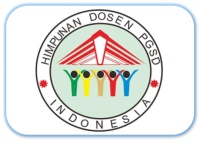HUBUNGAN KONTROL DIRI DENGAN PERILAKU MENYONTEK SISWA
Abstract
Full Text:
PDFReferences
Alhadza. A. (2002). Masalah Menyontek (cheating) di Dunia pendidikan. Jurnal Pendidikan dan Kebudayaan 8 (38)
Calhoun J. F. dan Acocella J. R. (1990). Psikologi tentang penyesuaian dan hubungan kemanusiaan. (terjemahan RS. Satmako). Semarang: IKIP Semarang
Desyandri. (2018). Nilai-nilai Kearifan Lokal untuk Menumbuhkembangkan Literasi Budaya di Sekolah Dasar. Sekolah Dasar: Kajian Teori Dan Praktik Pendidikan, 27(1), 1–9. http://doi.org/http://dx.doi.org/10.17977/um009v27i12018p001
Firman &Karneli, Y., Hariko, R. (2016). Pencegahan Tindakan Kekerasan Melalui Pengembangan Panduan Pelaksanaan Layanan Informasi Menggunakan Pendekatan Problem Solving Dalam Peningkatan Kontrol Diri Siswa Sekolah Menengah Kejuruan (Smk) Kota Padang. Padang: FIP UNP
Hartanto, D. (2012). Menyontek: Mengungkap Akar Masalah dan Solusinya. Jakarta: Indeks.
Intan Sari, Marjohan, Neviwarni. (2013). Locus of Control dan Perilaku Menyontek Serta Implikasinya Terhadap Bimbingan dan Konseling. Jurnal Ilmiah Konseling. Vo 2 No. 3: 267-272
M. Nur Ghufron & Rini Risnawati. (2010). Teori Psikologi. Jakarta. Ar-Ruzz Media
Nafessa. (2017). Hubungan Kontrol Diri dengan Perilaku Menyontek pada Siswa YP MTs Al¬-Azhar. Medan. Jurnal Diversitas UMA, 3 (1), 57-66
Nur Asiah, Taufik, Firman. (2018). Hubungan Self Control dengan kecenderungan Narsistik Siswa Pengguna Jejaring Sosial Instagram. Jurnal Neo Konseling, Vol 00 No. 00: 1-7
Nursalam. (2012). Intensitas Copyng Answer pada Tes Kemampuan Matematika, Lentera Pendidikan. Vol 15 No.1:32-40
Riska Ahmad. (2017). Teacher Guidance and Counseling Efforts To Prevent Cheating Behaviuor. Atlantis Press
Syilvina Sari, Yusri, Azrul Said. (2016). Kontrol Diri Siswa dalam Belajar dan Persepsi siswa Terhadap Upaya Guru BK Untuk Meningkatkan Kontrol Diri. JPGI, Vol 2 No. 2: 32-37
The Liang Gie. (1995). Cara belajar yang efisien . Yogyakarta: Liberty
Tim Penyusun Pusat Bahasa. (2005). Kamus Besar Bahasa Indonesia. Jakarta: Balai
Virza Agustin. (2013). Perilaku Menyontek Siswa SMA Negeri Kota Padang Serta Upaya Pencegahan Oleh Guru BK. Skripsi tidak diterbitkan. Padang: UNP FIP BK
DOI: http://dx.doi.org/10.24036/e-jipsd.v7i9.5146


